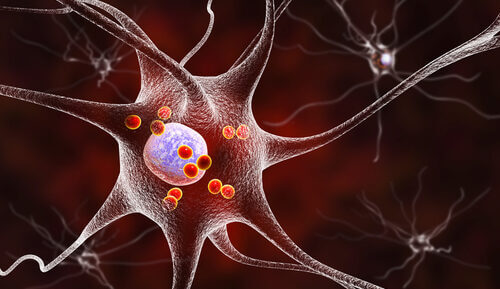
Page contents
Vascular dementia is a common form of dementia that is caused by decreased blood flow to the brain.
The brain’s vascular system is what carries blood to brain cells, feeding them with oxygen and vital nutrients that enable them to function well.
If this system is damaged or blocked, cells can cease to work properly and can eventually die. This causes many cognitive problems and can be fatal.
Vascular dementia is the second most common form of dementia, after Alzheimer’s disease. It accounts for around 20% of cases with approximately 150,000 people in the UK living with the disease.
Common causes of vascular dementia
Often vascular dementia develops naturally as the brain ages, but many factors can cause blood vessels in the brain to become blocked or damaged. Some of these include:
Physical trauma
- Stroke or mini-strokes
- Heart attack
- Brain damage from an accident or inflammation
Other health conditions
- Diabetes
- High cholesterol
- High blood pressure
- Atherosclerosis (abnormally ageing of blood vessels caused by the build of cholesterol and other substances in the arteries)
Lifestyle factors
- Smoking
- Obesity
- Lack of exercise
- Excessive alcohol – this isn’t a cause in itself because there is a specific Alcoholic Dementia but it can hugely exacerbate damage caused by other factors or even cause brain damage that leads to vascular dementia.
Signs and symptoms of vascular dementia
The symptoms of vascular dementia are very similar to those of other forms of dementia, the key difference is the cause. Symptoms include:
- Memory loss
- Confusion
- Difficulty concentrating
- Difficulty organising thoughts, becoming muddled
- Inability or difficulty with analysing a situation or conversation
- Not being able to make a decision
- Repetition
- Struggling to have a conversation due to inability to remember what the other person has said or process the meaning of what they’ve said
- Drastic changes in mood and cognitive ability. One day they may be cheerful and cognitively sharp, a few hours later they could be depressed and very confused.
Vascular dementia treatment
There is currently no cure for vascular dementia but it can be treated or slowed down by addressing the cause.
If the vascular dementia was caused by another medical issue, such as high blood pressure, taking medication for this issue can slow down or prevent further damage.
If the dementia is caused by lifestyle factors, relevant lifestyle changes, such as quitting smoking if it was caused by smoking, can prevent further damage to the brain’s vascular system. Even if the illness wasn’t caused by lifestyle factors, practices for good health such as regular exercise, a healthy diet, not smoking or drinking and becoming a healthy weight can all increase the blood flow and nutrients to the brain.
Vascular dementia stages timeline
Vascular dementia generally gets worse over time and its prognosis is rarely good. Sadly, the disease can be fatal as more brain cells die. Life expectancy for people with vascular dementia is around five years on average. This can be shorter or much longer, depending on the cause of their vascular dementia and the effectiveness of treatment.
The cognitive decline caused by vascular dementia can be organised into seven distinct stages, but it is very difficult to put these on a timeline as each case is highly individual. One person may decline rapidly while another may take years to move through the stages. The stages are:
| Stage One | No cognitive impairment at all |
| Stage Two | Very mild symptoms, such as a little forgetfulness, but the person can function more or less as normal. |
| Stage Three | Mild cognitive impairment. This stage is generally the longest and many people can continue to live a normal life with methods to manage their symptoms, such as relying more on a diary and notes to keep organised. |
| Stage Four | Moderate cognitive decline. People may need support as they find things such as organisation, managing finances and concentrating more difficult. They are also most likely to be in denial about their symptoms at this stage. |
| Stave Five | Moderately severe cognitive decline. The person may be very confused and unable to look after themselves alone. Many people choose to move into a care home at this stage. |
| Stage Six | Severe cognitive decline. By this stage, the person will be completely dependent on receiving care. They may be unable to recognise loved ones and have trouble speaking. |
| Stage Seven | Very severe cognitive decline. People at this point can be non-verbal or unable to move. |
What to do if you have symptoms of dementia
If you or a loved one is showing symptoms of dementia, getting a diagnosis as soon as possible is essential This will allow you identify the type of dementia you have and if it is vascular, allow you to identify the cause and make a plan for treatment. Speak to your GP who will arrange an assessment.
Find your ideal care home
- Explore a wide range of care options and facilities
- Read independent ratings and reviews
- Connect directly with care homes to book a tour and discuss your needs


